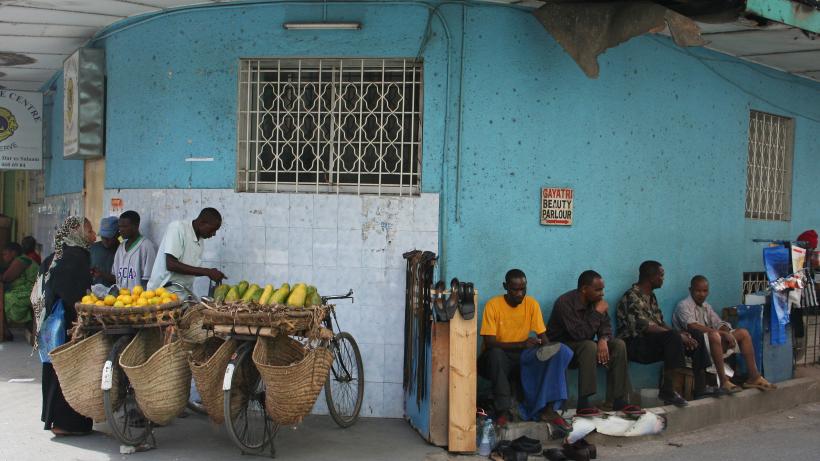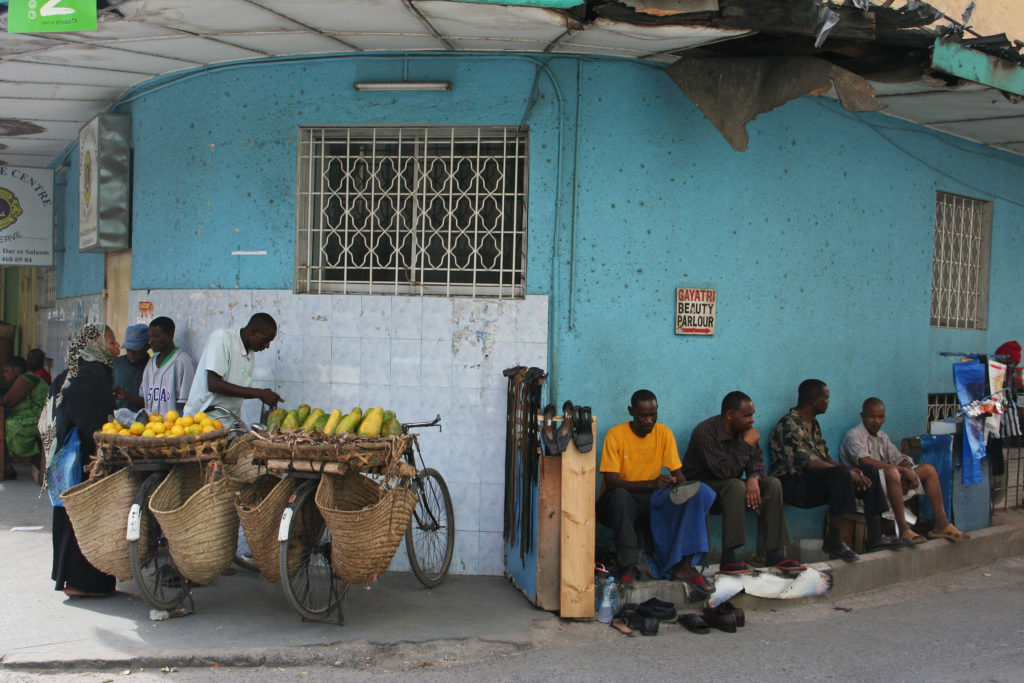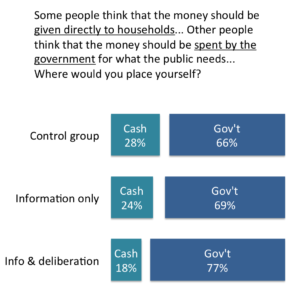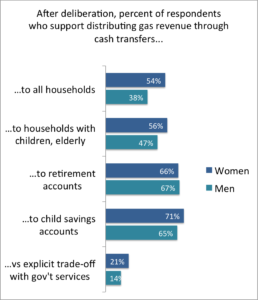
The political paradox of cash transfers
Impact evaluations show cash transfers are effective. But polls show Tanzanians would rather have government services.
This is the second post in a three-part blog series on political transparency of natural resource management.
Cash transfers are all the rage among international development experts, and for good reason. In Tanzania, which is our focus here, randomised controlled trial (RCT) results show that the government’s pilot cash transfer program led to increased savings and livestock investment, reduced child illness, and improved education outcomes, with no increase in tobacco or alcohol expenditure. Myriad studies in other contexts reach similar findings.

Dar es Salaam
Image credit: imke.stahlmann
There are also good reasons for Tanzanians to doubt the efficacy of spending natural gas revenues though regular government channels. Rakesh Rajani, former director of Tanzanian civil society organization Twaweza, remarked that after years of lobbying the government to spend more on education, he finally got what he wanted, and learned to stop asking. Tanzania dramatically increased its primary education over the past decade, but Twaweza research found enormous leakage between what was allocated to schools and what actually reached them. Worse, many children who are enrolled in government primary schools can’t read or do basic maths. In this context, you might expect citizens to prefer cash in their pockets over bigger budgets for the ministry of education.
Survey says…
You’d be wrong. Results from our recent poll show that about two-thirds of Tanzanian voters would rather spend gas revenues on government services than cash transfers. That’s an even stronger rejection of cash than in earlier polling by Twaweza, which found voters preferred government spending on health, education, and security services over direct distribution of natural gas revenues, 43% to 38%. It’s not that people hate cash. When we asked respondents about the idea of using gas revenue for cash transfers without specifying any other policy options, they were more enthusiastic. A majority of Tanzanians supported direct distribution in general (62%) — more so if transfers were targeted to children and the elderly (68%), and even more so if targeted to child savings accounts (77%). But that support fell dramatically once the question was posed as a tradeoff between direct distribution and the alternative of the government spending the revenues.
If question phrasing matters so much, perhaps voters just need to stop and think this issue through. So what happened to support for cash transfers when we subjected respondents to our RCT in deliberative democracy?
After intensive deliberation — watching videos that presented experiences ranging from Tanzania’s own cash transfer experience to the Alaskan model, debating with each other, and asking questions of policymakers and researchers — people’s views about cash transfers were significantly different. They became even more convinced that government should spend the money itself. The share of Tanzanians who prefer direct distribution over government spending fell from 28% to 18% after deliberation. In short, the more people heard and talked about cash transfers, the less they liked the idea.

Figure 1. Cash transfers vs. government spending
Explanations: Who doesn’t like money?
To explain the low level of support for cash transfers, we spliced the data a variety of ways: by wealth, education, gender, and a measure of trust in government.
Based on conversations with opposition politicians in Dar es Salaam, we speculated that people who trust the current government less would be more supportive of cash. What we found is the opposite: more trust in government yields more support for direct distribution, although this correlation is not statistically significant. We can only speculate after the fact as to why. Perhaps respondents preferred the known to the unknown: schools and health clinics have, after all, been built in most villages in rural Tanzania in the last 30 years. During deliberation, participants questioned the mechanisms required to channel cash directly to households. Who would be in charge of accounting for that transfer?
two-thirds of Tanzanian voters would rather spend gas revenues on government services than cash transfers.
Anecdotally, one reason respondents cited for favoring government spending over direct distribution during the discussion was that social services encourage a collective voice that helps increase accountability, while cash transfers would focus people on private interests and leave room for corruption.
We found a bit more support for the idea that poorer, less educated people are more in favor of cash. This gap is not huge, though. If we disaggregate Figure 1 between the wealthier half and the poorer half of the deliberation treatment group, there’s about a 5 percent difference in support for cash. (In Tanzania, the bottom half of our national sample would be almost entirely below the international poverty line of $1.25 per day in PPP terms.)
Statistically, the strongest explanation of cash preferences is gender — and in particular, the interaction between gender and deliberation.
In the control group (not shown) men and women reported nearly identical views about cash transfers. Two days of information and deliberation did nothing to change women’s minds. But men, on the other hand, saw a fairly large decline in support for cash. If you look at the results in Figure 2, showing people’s opinions after deliberation, you’ll see men are notably less enthusiastic about distributing money in general, as well as to households with children and elderly members specifically. None of these gender differences existed before deliberation.
In sum, cash transfers appeal to poorer people and, once they’ve thought hard about it, women more than men. But all demographic groups (rich, poor, men, women, etc.) prefer government spending to cash.

Figure 2. People like cash transfers in principle, especially women and especially when targeted to vulnerable groups or for savings, but both men and women prefer government services
Try it, you’ll like it
How much should these poll results matter to economists advocating cash transfer programs in the developing world?
Cash transfers might bring systemic benefits that aren’t immediately obvious to individual citizens responding to a poll. For instance, in a low-income country, sovereign rents from big oil or gas discoveries may seriously distort the relationship between government and citizens. Colleagues at CGD argue that direct distribution of natural resource rents can help maintain the link between government revenue and citizen accountability. Their argument (known as “oil-to-cash,” or in Tanzanian’s case, gas-to-cash) is that if a government like Tanzania’s commits to distribute at least some of the windfall revenues directly to its own citizens, they’ll be more likely to have the information (about total gas revenue for example) and expectations (about future transfers) that will discourage misappropriation.
By this argument, democracy depends on cash transfers, rather than vice versa.
Another response to these poll results is that people might prefer cash transfers once exposed to them. James Ferguson’s recent book, Give a Man a Fish, documents the mass politics behind widespread social transfers in South Africa and neighboring countries. We suspect poll numbers would look different in these countries where a significant share of the population already depends on government transfers for a large share of their livelihood.
But the idea that people don’t know what’s best for them is hard to square with the finding that support for cash fell significantly when respondents in the RCT learned more about direct distribution proposals. You would have expected the opposite effect.
For now, it is interesting that in a low-income democracy like Tanzania, cash transfers remain a fairly technocratic fad, rather than a movement with popular, grassroots support. In Tanzania, people appear to trust their government more than economists do.
This blog was originally posted here on Center for Global Development’s website. This is part II in our blog series on managing Tanzania's newfound natural gas wealth. Read part I on fuel subsidies and part III

